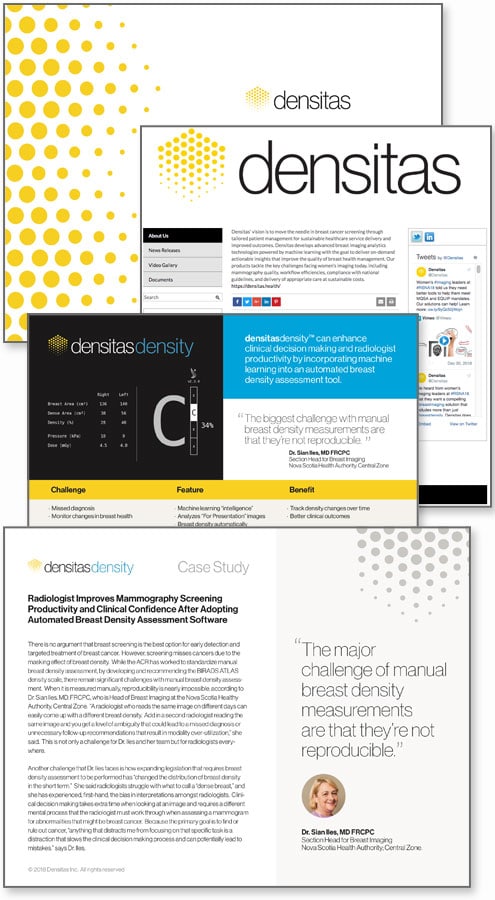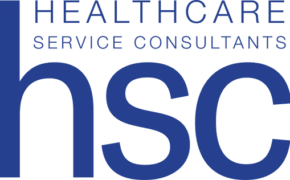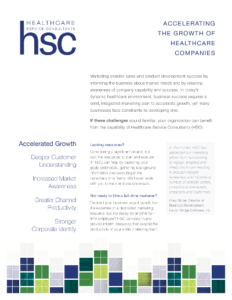Table of Contents
 This case study features Densitas, a Canadian start-up that is commercializing artificial intelligence (AI)-based analytics to improve breast cancer imaging and diagnosis. When we started working with the company, they were in the very early stages of entering the U.S. market. They did not have many contacts in the states and they did not have a well developed go to market strategy. By the end of Healthcare Service Consultants’ 13-month engagement, the company was able to:
This case study features Densitas, a Canadian start-up that is commercializing artificial intelligence (AI)-based analytics to improve breast cancer imaging and diagnosis. When we started working with the company, they were in the very early stages of entering the U.S. market. They did not have many contacts in the states and they did not have a well developed go to market strategy. By the end of Healthcare Service Consultants’ 13-month engagement, the company was able to:
- Prove itself as an authority in breast density assessment and reporting
- Become a known entity in Canada, the U.S., and across the globe
- Accelerate the company’s efforts to become a source of credible information about breast cancer risk assessment
1. Client Company Overview
Densitas grew out of academia. Having been based in academia, the key contributors were extremely knowledgeable in the foundation of AI-based healthcare analytics, automated breast density assessment and cancer risk modeling.
Densitas developed software that automatically measured breast density by analyzing screening mammograms. The company also developed quality management software that enabled women’s imaging practice leaders to better understand and track breast density findings and other risk factors for breast cancer.
Densitas had a unique advantage in that they focused on the very “hot topic” of women’s health, breast density, and breast cancer. This facilitated the company’s ability to leverage earned content to get visibility in the trade press, and present at conferences to create awareness of the company, its leadership and its mission.
Primary market drivers were:
- A need for healthcare providers to deliver better outcomes through improved breast cancer risk assessment.
- High incidence of missed cancers in women with dense breasts.
- Unacceptably high rates of poor image quality in annual accreditation audits.
Densitas’s solutions addressed these needs, providing fully automated, on-demand actionable insights and analytics for:
- radiologists
- radiological technologists
- diagnostic imaging managers
- QC technologists
- health system administrators
2. Challenges
2.1 Minimal Marketing
Like many of the companies we assist, Densitas had little market presence and awareness when we began helping them. The CEO and other company players were doing their best to contribute to the marketing effort, but the messaging was too technical, too wordy and too internally focused. And no one was leveraging the many articles and conference talks they were involved in to create thought leadership content.
2.2 Features-Focused, Not Benefits
Densitas’s academic background was an important factor for product success and building credibility amongst other thought leaders. Unfortunately, this was also creating obstacles to marketing and sales success. The language they were using was highly technical and tended toward academic verbiage. Marketing content was features- and function-focused. This prevented anyone but the most technical, academic buyer from comprehending the full value of their product offering.
2.3 Lacked Knowledge, Contacts in the U.S. Market
As a Canadian start-up, Densitas had minimal understanding of the U.S. market and its purchase decision-making and budgeting processes. The company did sell globally but wanted to expand its market awareness in the states because of the market size and commitment to quality women’s health.
3. How We Helped

3.1 Implemented Benefits-Based Language
Our overhaul of the features- and function-based language became the basis for all subsequent marketing assets and sales collateral. We used the general public’s heightened awareness and the healthcare industry’s sensitivity about breast cancer screening as an avenue to deploy more meaningful, benefits-driven verbiage.
3.2 Tapped Into Existing Market Awareness
Densitas worked in a space in which the challenges and implications were uniquely well understood: women’s imaging. Breast density was a widely-known and often published topic in:
- trade and consumer publications
- Professional journals
- advocacy group websites
We monitored all three to leverage articles and announcements for marketing purposes. By sharing these trusted sources on social media, via email marketing and other platforms, we created the opportunity to weave in the company’s refined messaging. This positioned their broader capabilities within the goal of reducing the incidence of missed breast cancer diagnosis via imaging and developing risk models that predict which women might be at a higher risk of developing breast cancer. As a result, we successfully tied the company’s solutions to important women’s health issues that are important to both women’s healthcare providers and service line administrators.
3.3 Positioned Densitas as an Authority
Federal and state regulations for breast density assessments were evolving and are inconsistent across the U.S.. Part of our strategy was to position Densitas as an educational resource for news related to these regulations. The CEO spoke frequently at conferences around the globe, which created opportunities to position him as a global thought leader for an important public health issue. This provided a foundation for educational content and earned content that helped position Densitas as an authority in their field.
4. Results
In just over a year (13 months), we were able to redirect and focus Densitas’s marketing approach and messaging strategy. Moving from academic language to benefits-based messaging that resonated with their buyer personas, provided clarity of product value among buyers and influencers. The educational space in which we were able to place Densitas’s expertise gave them unique credibility and a thought leadership position second to none. Most importantly, the company’s pivot allowed them to be seen as a viable commercial solution.
5. Let Us Help You
Contact us if you feel your company could also benefit from improved positioning and a strategic marketing approach.

